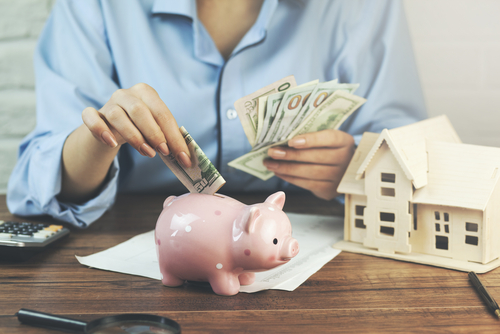I have been a real estate investor in Dallas, Texas for over 10 years, and just like many of you, I started part-time. Now I’m a full-time investor. Many investors start as part-time with the intention of going full-time. Let me explain how I was able to go full-time with rental property investing. Not only for the wealth building capabilities rental properties create, but also for the cash flow. Here’s an investment vehicle that not only creates income but also creates long term wealth.
For me, it’s very difficult to understand why investors don’t invest more in single-family homes as buy-and holds. Especially when I experience and witness the income results from these properties’ long-term wealth building. I think in some investors’ eyes, having rentals is similar to having a savings account in a bank.
(On a side note, I do have to say, saving money in a traditional bank account is not exciting, it’s not sexy. It’s difficult to get motivated to do it and there are a lot of reasons many people don’t or can’t save money in the traditional way. The U.S. Bureau of Economic Analysis states that the average person saves only about 5.7 percent of their annual income. I’ll admit, I’m even shocked at that number. I would have guessed it to be much less. My point being that saving is not exciting and I think for similar reasons to some, investing in rental properties is seen as not exciting either.)
Traditional Banking Accounts versus Buy-and-Hold Strategy
The average savings account in the United States earns about .06 percent interest according to the FDIC’s March 27, 2017 report. Now, that is not a significant return and it doesn’t motivate people to want to save money within a traditional bank.
On the other hand, rental property generates income for you, you can equate that cash flow to the interest you earn in a savings account. However, it’s much more significant in terms of the return rate. To an investor, that’s a slow trickle of cash flow each month earned off a rental property, whether it’s $100, $200 or $300 per month. I think for those who are considering investing in rental real estate, traditional savings accounts do not earn a significant enough interest when they compare buying a property that can earn a couple or few hundred dollars per month versus .06 percent interest.
With rentals, your cash flow could continue for the rest of your life or the rest of the time you own the property. I can clearly see where the same concept of a slow rate of return or a slow drip from a bank savings account could be applied to the concept of owning rental real estate. Yet the slow drip of a bank savings account doesn’t have a significant return and rentals do.
There is an obvious rate of return between your rental properties and the .06 percent return in your savings account. You are earning about 10 to 20 times more than the bank interest. However, some may argue that the savings account is liquid and someone can get immediate access to their money which cannot be done with a rental property. Well, I beg to differ. I like to think of each rental property like a savings account but earning a much higher rate of return or higher amount of interest, but I also think of them as being very liquid. If I need to get equity, cash or capital, I simply refinance those rental properties or perhaps sell them. So, someone can’t really use the lack of liquidity as an argument when it comes to rental properties. They’re very liquid and usable.
Saving as a Concept
Let’s talk then about the concept of savings. Here, in the United States we hear that we need to save 10 percent of our earned income. As I’m sure you can tell from the above information, as a society, we are failing to save that much. (Remember the 5.7 percent I previously mentioned.) So, we still have a long way to go.
To that point, many real estate investors apply the same principle of saving to their real estate investing. Many of the investors I work with on a day-to-day basis know investors need to save more money. Whether you’re an investor or not, try to avoid the “anti-savings” mentality.
I recommend you overcome this mindset in your real estate investing by setting a goal to save a certain percentage of everything you buy. Meaning, save a certain percentage of the properties you purchase each year as rentals. For instance, if you buy 10 properties a year set a goal to save 10 percent of all the properties you buy each year as a buy-and-hold rental. In this example, that would be one property per year. I can honestly tell you, 20 percent of all the properties I buy every year I save as buy-and-hold rental properties, and to this day I have yet to sell a single property.
So, I’ve applied a 20 percent factor to my business. I saved two out of every 10 properties. Maybe that’s a good factor for you. Maybe you are able to or want to or can save even more. Maybe you could save 30 percent or three out of every 10 properties you buy. Perhaps you’re just turning out that 10 percent or 1 out of every 10 properties you buy. Whatever amount, make it your goal. Just like how we know we should save 10 percent of our income, set a similar goal with your real estate investing.
Why Aren’t Other Investors Doing It?
We’ve talked about the similarities of buy-and-hold rentals as real estate. We’ve discussed slow rates of return in traditional savings accounts versus rental returns. We also talked about how the concept is similar in that you’ve got to set a goal, just like you how to save a certain percent of your income. So, with all that being said, why don’t investors save more as buy-and-hold properties?
Why are we so enticed with selling properties quickly? There’s a lot of reasons. I would say the most common is, once again, quite similar to our personal savings strategies. When we get a paycheck on Friday, so many people immediately go out and spend it, whether it’s on dinners, movies, furniture or a new television. That check disappears quickly and the same is true for real estate investors.
When we buy property, we get it under contract and we close the sale. We look at the property and realize we can quickly sell it whether that is as a wholesale transaction or we can fix-and-flip it as a rehab transaction. We can earn a significant return relatively quick. Much like going out Friday evening and buying that flat screen TV on payday. We can buy that property and wholesale it, maybe making $10,000 or $20,000 in profit, literally in a matter of days. I’ll admit, it’s very challenging. Much like when you get the paycheck on Friday, it’s challenging to set aside 10 percent of it into a bank savings account.
You look at the property and realize you could make $20,000 as a wholesale transaction or you could earn $200 a month off of it. It’s not hard to understand why we’re all so tempted just like we’re tempted by the lure of a flat screen television set on a Friday evening payday. We’re equally as tempted by the lure of a quick wholesale deal and the profit in a matter of days versus the cash flow and the wealth building over a matter of years.
All-in-all, you need to recognize the power of rental real estate, buy-and-hold properties. Understand the differences from traditional savings and the returns you can enjoy as a result of a being a buy-and-hold investor.
Kevin Guz is an investor and podcaster. You can listen to all his podcasts here, http://www.blogtalkradio.com/kevinguz.
























0 Comments